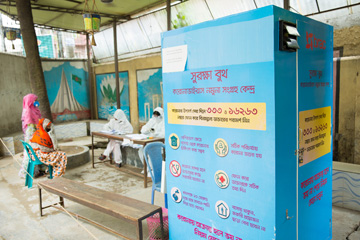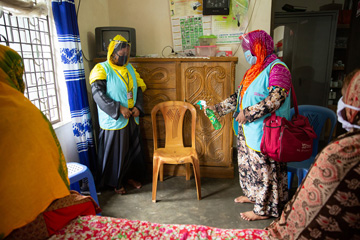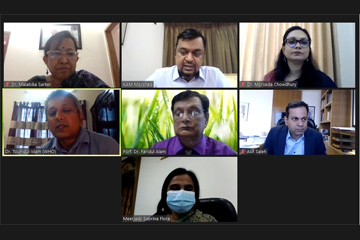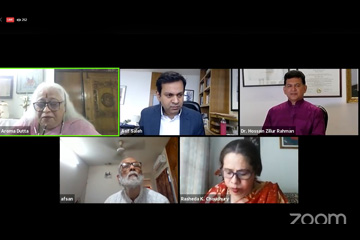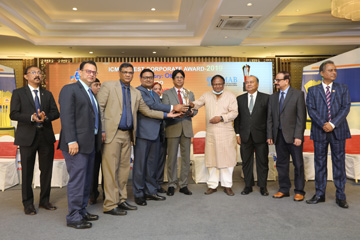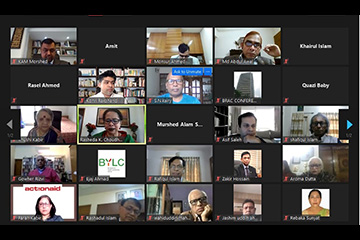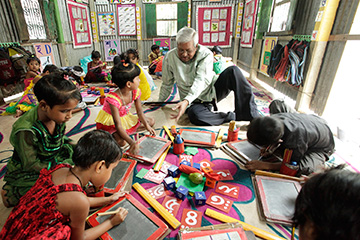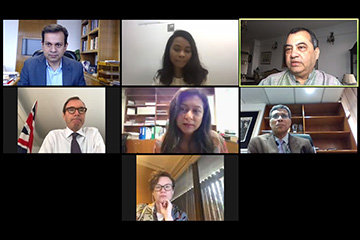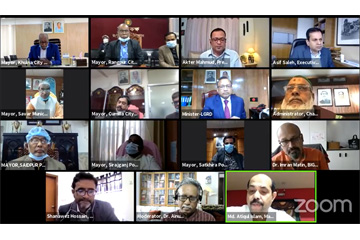
News (828)
BRAC to start antigen test from Saturday
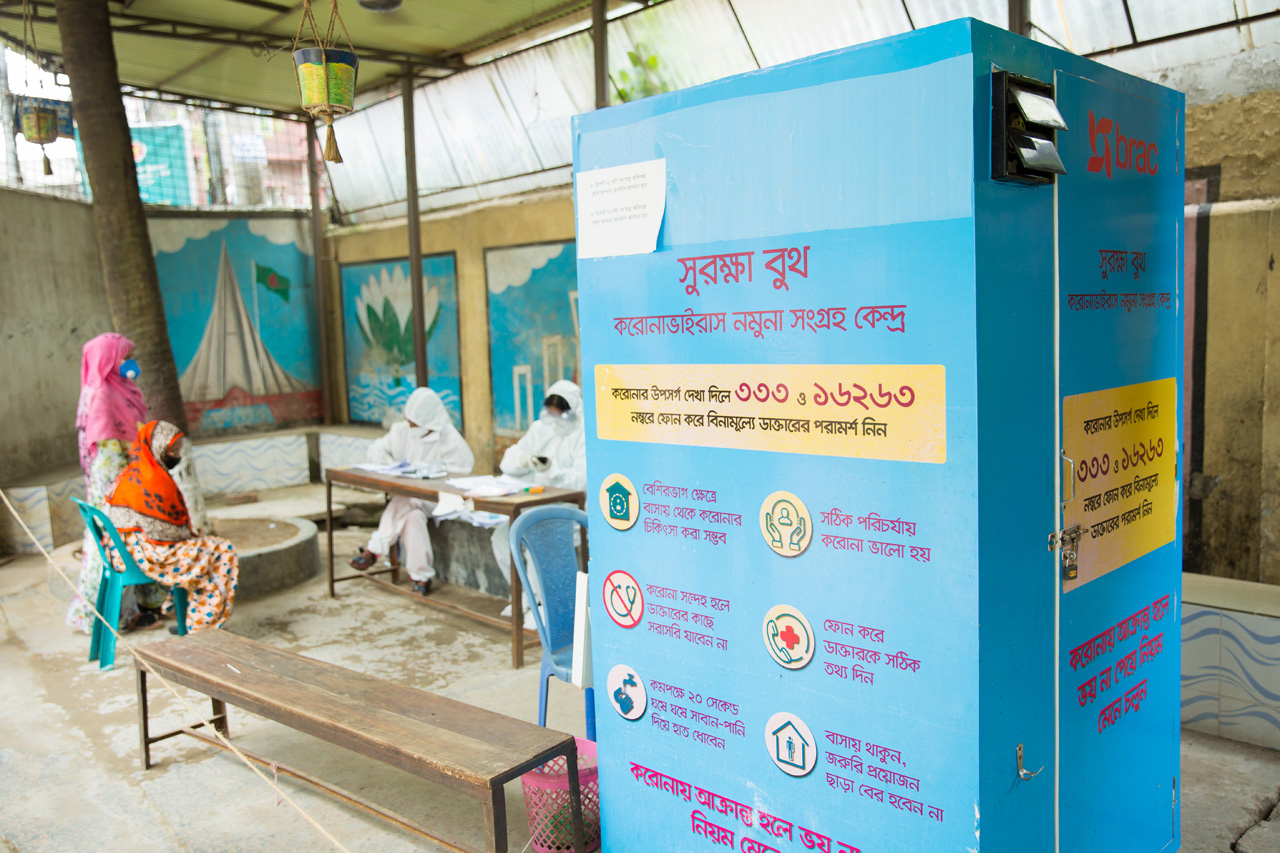
The activity will kick off primarily with 16 booths in Dhaka, Chittagong
BRAC will launch antigen-based COVID-19 rapid testing for suspected patients to get results within a comparatively shorter time period. The activity will be run under the overall supervision of the Directorate General of Health Services (DGHS). The service will initiate from tomorrow, Saturday primarily with 16 booths- 15 in Dhaka and one in Chattogram.
BRAC since March 2020 has been collecting samples to detect Coronavirus through RT-PCR test by installing testing booths (kiosks) in different parts of the country. It is now adding the Rapid Antigen Test to the existing facilities.
The plan to expand this activity has come amid the new surge in COVID-19 cases. The Rapid Antigen Test facility will gradually expand to BRAC’s 32 testing booths in Dhaka and 4 testing booths in Chattogram, according to the Health, Nutrition and Population Programme (HNPP) of BRAC.
The booths are open from 9am to 12 noon from Saturday to Thursday. Each of the booths will be able to collect and analyse 150 samples a day.
Currently, RT-PCR tests are followed in Bangladesh for the majority of the samples, which takes at least 24 hours or more to get the results. But, an antigen test will deliver the result within 30 minutes only, which, BRAC expects, will add pace to the government’s COVID-19 testing operations.
As part of its effort to support DGHS, BRAC is operating 41 walk-in sample collection booths in areas vulnerable to Novel Coronavirus across the country. These samples are transferred to government approved laboratories that deliver results after testing them in the RT-PCR process. Five of these booths are designated only to collect samples from the passengers going abroad.
Director of BRAC Health, Nutrition and Population Programme Morseda Chowdhury said, “Bangladesh’s health system got some time to prepare itself to deal with the first wave of COVID-19, but the second wave appeared too fast. To tackle the situation, there is no alternative to maintain health advisories, along with testing suspects and referring them for isolation. I hope taking the Rapid Antigen Test to the doors of the people will play an important role in this regard, as it will help speedy diagnosis and management of the patients.”
She further said, “The benefits of this initiative must be taken to all the regions vulnerable to COVID-19 for which assistance from all quarters is essential. At present, donor organisation The Foreign, Commonwealth & Development Office (FCDO) of the Government of UK is supporting BRAC and DGHS in this effort.”
Who and how to get the service
Anyone who has been referred by a registered physician, is experiencing COVID-19 symptoms like fever, dry cough, fatigue, sore throat and respiratory difficulties, or has been in contact with a confirmed COVID-19 patient, is eligible to undergo the test through BRAC operated booths.
A person must take an appointment online to get the service. The BRAC staff employed at the booths will assess the symptoms and case history of the suspect to decide whether it will be an antigen test or an RT-PCR test. If the result of a sample analysed via antigen testing detects the presence of the novel coronavirus, the service seeker will be notified within 30 minutes. Results of a positive patient tested via antigen testing will be uploaded in the website within three or four hours.
However, if a person’s antigen test results come back negative despite having symptoms, the sample will be retested using the RT-PCR procedure (sample from the patient, however will be taken once).
To get the test via BRAC booth, a person must take an online appointment at coronatest.brac.net. They must pay the government fixed Tk100 as fee via mobile money service Nagad App to get the service.
The total process of sample submission is designed in a 7-step process.
How to apply online
A service seeker must log on to coronatest.brac.net and select “COVID identification for tomorrow” tab. The answer must be “yes” to any of the three questions asked in the tab. He/she will have to select the district or city and find out the nearest booth of his/her location.
In the third step, he must click in “I agree and want a COVID-19 test” option. Clicking on the button will create an application form.
The form must be filled with necessary information, including a mobile contact number or e-mail address. Once the information is submitted, a verification code will be sent to the registered mobile number. This is why information of a correct mobile number is essential. Once the person enters the code in the website, it will confirm the application.
To complete the application, he/she has to enter the Nagad app and click on the tab “Bill Pay” where there will be an option saying fee for COVID-19 sample collection. Then select "MOHFW COVID-19 Test Booth" and pay Tk100.
Successful payment will generate a transaction code. People paying the fee from Nagad App will get a code from the app, while people paying the money from the website will get it through Short Messaging Services (SMS).
In the last stage, the person must enter a transaction number in the website to complete the application. Confirmation of the application will be sent via an SMS.
Once the sample is collected, it will be sent to the laboratories designated by DGHS. The results of the test will be sent to the recipients via SMS. BRAC does not collect any money from the test fees, which goes to the government exchequer for public welfare.
Time for report delivery
If the result of a sample analysed via antigen testing detects the presence of the novel coronavirus, the service seeker will be notified within 30 minutes and results of a positive patient will be uploaded in the website within three or four hours.
But samples collected via BRAC booths for RT-PCR tests are transferred to DGHS authorised laboratories. It is on DGHS to inform the service seeker about reports depending on the capacity of the laboratories. BRAC does not hold the jurisdiction over the time taken to test the samples and generate reports from the laboratories.
Location of BRAC Booths
BRAC will collect samples for antigen testing at 10 booths under Dhaka North City Corporation, nine booths under Dhaka South City Corporation and one booth under Chattogram City Corporation.
Among them, facilities under DNCC are available at Govt Unani and Ayurvedic Medical College Hospital in Mirpur 13, Uttara Adhunik Medical College in Sector-9 of Uttara, Uttara High School at Sector-6 of Uttara, Asaduzzaman Khan Kamal Community Center at Modhubagh of Moghbazar, Ward 10 community centre near Buddhijibi Graveyard in Mirpur-1, Chaderhat Eidgah Playground at Babor Road of Mohammadpur, Dhaka Dental College and Hospital at Mirpur 14, National Institute of Kidney Diseases & Urology in Agargaon of Sher-e-Bangla Nagar, Abdul Halim Community Center at Tejturi Bazar at Farmgate, and York Hospital (House-12, Road-22) in Banani.
Antigen services under DSCC will be available at Paltan Community Center in Naya Paltan, Bashabo Community Center, Wari Girls Government Primary School, Dhaka National Medical College in Johnson Road of Old Dhaka, and Maternal and Child Health Training Institute in Azimpur.
Office of the ward councilor in Bibirhat at Panchlaish under Chattogram City Corporation will also offer the service.
Responding to the government’s call in COVID-19 prevention activities, BRAC’s walk-in sample collection booths (kiosk) have been collecting samples of the suspected patients since March 11 last year, among which 41 are currently in operation.
BRAC, partner NGOs to mobilise communities in 38 districts under high covid risk, 58 million people to reap the benefit
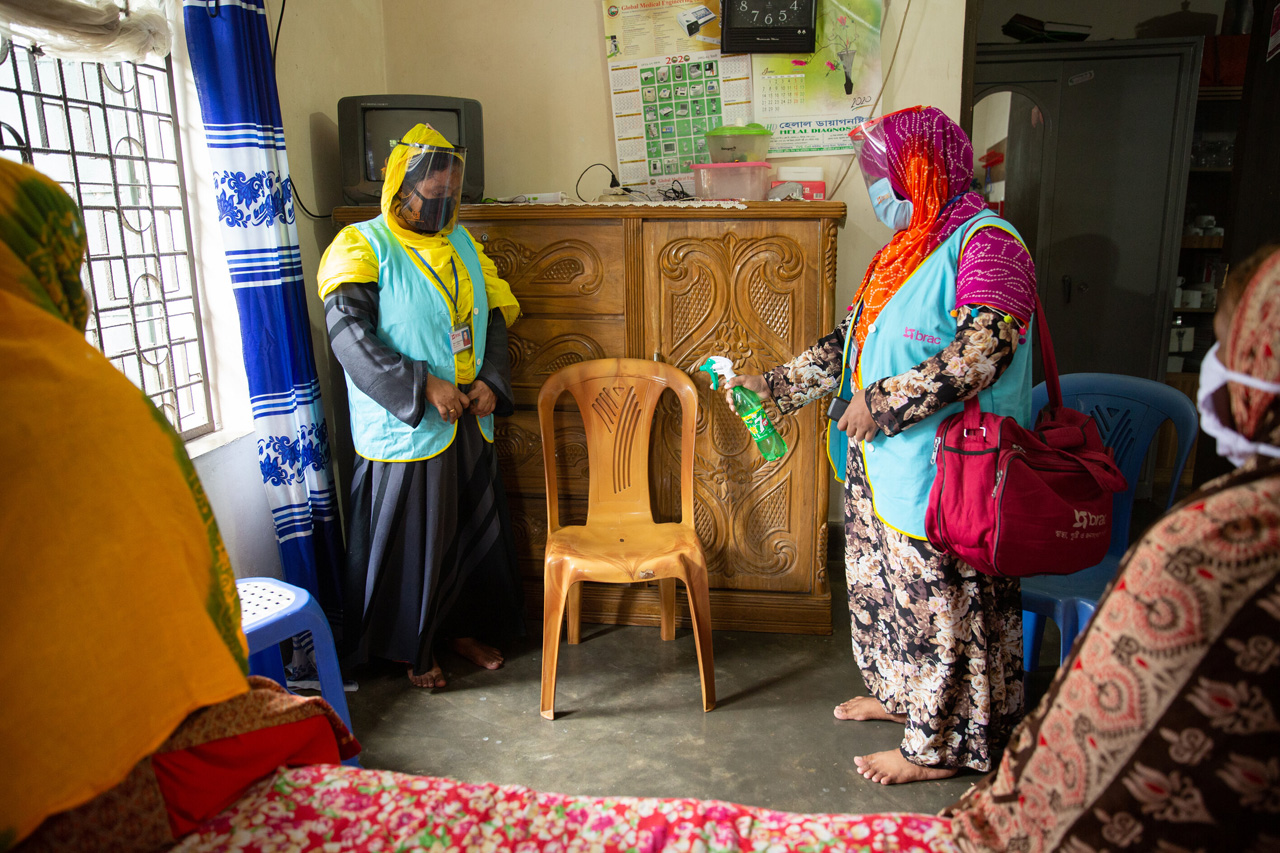
BRAC has taken up an initiative to support people living in the 38 high risk districts across Bangladesh. BRAC along with partner NGOs are all set to implement the plan through a community-driven COVID response and local level health system strengthening initiative. The decision was reached at an emergency meeting with the recently formed platform Civil Society Organisation (CSO) Alliance today on Thursday (15 April). The meeting decided that NGOs will collaboratively work across Bangladesh under an initiative styled ‘Community resilience to prevent coronavirus’ (করোনা প্রতিরোধে সামাজিক দূর্গ).
The emergency meeting was chaired by Civil Society Organisation (CSO) Alliance coordinator and advisor to former caretaker government Rasheda K Chowdhury. PRIP Trust executive director Aroma Dutta, Ahsania Mission ED Dr M Ehsanur Rahman, Hasin Jahan, Sultana Kamal, Maleka Banu, RDRS chairperson Shib Narayan Kairy and WaterAid regional director Khairul Islam also attended the meeting.
With this initiative, the NGOs together will work on spreading information on coronavirus prevention, proper use of masks and vaccine registration along with spreading awareness messages and addressing misinformation to around 58 million people living in the 38 high risk districts.
The high-risk districts with case positivity rate above 10 percent are: Dhaka, Chottogram, Rangamati Sylhet, Moulvibazar, Munshiganj, Narsingdi, Khulna, Narayanganj, Rajbari, Feni, Noakhali, Chandpur, Shariatpur, Laxmipur, Cumilla, Barisal, Rajshahi, Bogura, Narail, Nilphamari, Gazipur, Faridpur, Brahmanbaria, Jessore, Madaripur, Naogaon, Rangpur, Kishoreganj, Natore, Tangail, Pirojpur, Patuakhali, Bhola, Manikganj, Gaibandha, Dinajpur, and Mymensingh.
With the rising COVID cases, increasing number of deaths, overburdened hospitals and acute crisis in ICU facilities in Bangladesh, community level prevention with a central approach has become an emergency now.
On one hand the healthcare professionals are struggling to manage the influx of patients, while on the other people still remain mostly negligent towards following the preventive measures and healthcare guidelines. In this context a stronger focus on behavioural change and community engagement to prevent and manage COVID becomes inevitable.
About the initiative, BRAC executive director Asif Saleh said, “The fight against coronavirus prevention requires long-term initiative. It is not possible to win the fight without participation from communities. We are mobilising internal resources to initiate the programme and calling on donors and partners to come forward to scale it up. This low cost model will lead to long term benefits if it can get proper financing, and will also speed up the government’s coronavirus prevention efforts.”
BRAC in partnership with The Foreign, Commonwealth & Development Office (FCDO) of the Government of UK and under a joint initiative with the Directorate General of Health Services (DGHS) and Community Clinic Trust has piloted a community-driven COVID response and health system strengthening initiative in six districts over the past five months. Based on the success of the pilot, BRAC will scale this initiative across the 38 high risky districts identified by Institute of Epidemiology Disease Control and Research (IEDCR). BRAC will work together with partner organisations on the ground to slow down the spread of COVID-19, help flatten the curve and preserve health system capacity in these high risk districts. The initiative will have three key pillars of interventions: prevention, response to COVID case management, and promoting vaccination.
Prevention: BRAC and partners will ensure mask use, hand hygiene and social distancing through household education. Community groups will be engaged in awareness activities and rapid response. In addition, local government officials, volunteers and community leaders will be empowered with knowledge on COVID-19 related issues to ensure preventive behaviours at hotspots such as mosques, transport hubs, markets, shops, etc. Periodic assessment will be conducted to see behavioural change in the community. BRAC’s observation shows that decrease in mask use is directly related to an increase in COVID positivity rate. Hence, stronger focus needs on prevention.
Response: BRAC’s proven Community Support Team (CST ) model led by frontline community health workers will be scaled for syndromic surveillance at household level. These community based teams will identify suspected COVID-19 cases by visiting households with potential cases (identified via word of mouth approach) to conduct screening. Individuals matching with sets of clinical criteria will be connected to the telemedicine services for further support. These households will also receive information on home management of mild and moderate cases, possible referral points and testing facilities, quarantine protocols and best practices to prevent further spread of infection among the household members. Follow-ups will be conducted to ensure quarantine compliance.
Vaccination: BRAC and partners will support the local government health office for COVID-19 vaccination registration and mobilisation. BRAC’s 50,000 community health workers and volunteers will actively engage in addressing myths and rumors creating vaccine hesitancy at the community level. Furthermore, vaccination will also be promoted in each of the districts through local level miking and message dissemination via national TV, radio, newspaper and social media.
BRAC-BUHS rapid assessment on impact of covid-19 on essential healthcare services
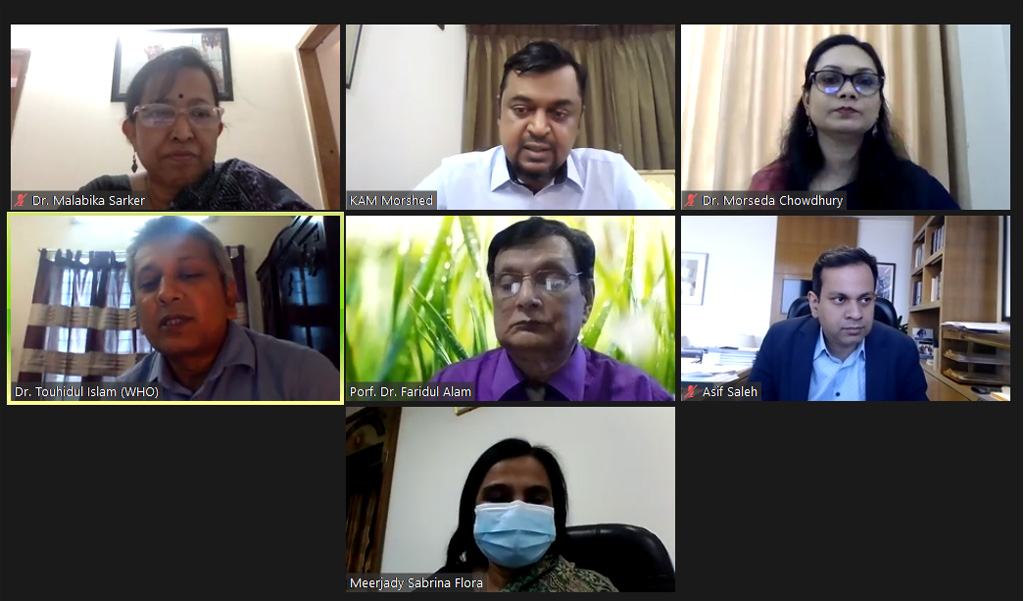
Antenatal care, postnatal care, under-5 vaccination, healthcare of emergency and chronic illness patients, elderly people and persons with disabilities suffered worse
A rapid assessment on the situation of essential healthcare in Bangladesh during the Covid-19 stresses that a number of areas of public health need enhanced effort to continue the fruits the nation had gained until the pandemic broke out last year.
According to the study report, pregnant mothers, mothers with newborns, vaccination of children below five years of age, patients needing emergency care and those with chronic illnesses, elderly people and persons with disabilities are suffering worse than others in terms of healthcare services during the ongoing pandemic situation. To remedy this situation, the report recommends that multi-faceted initiatives should be undertaken on a short and long term basis.
The findings and recommendations of the study titled “Impact of COVID-19 on Essential Health Services in Bangladesh: A rapid assessment” were shared at an online event organised by BRAC today on Sunday (11 April 2021). BRAC’s Advocacy for Social Change programme and Bangladesh University of Health Sciences (BUHS) conducted the study, which was commissioned by BRAC’s Health, Nutrition and Population Programme (HNPP).
Professor Meerjady Sabrina Flora, additional director general (planning), Directorate General of Health Services (DGHS),and Asif Saleh, Executive Director, BRAC were in presence as Chief Guest and Special Guest respectively.
In her speech, Professor Meerjady Sabrina Flora said covid-19 not only created sufferings for coronavirus patients or non-covid patients only, but it has also affected the government’s successful health programs and disease prevention programs as well.
“Along with the general people, the government wants to work together with committed associate organisations not only for covid-19 containment, but also to ensure essential healthcare facilities for all where partnering organisations will have equal partnership in the process being led by the government,” she said.
BRAC executive director Asif Saleh said, “Strengthening of the community system has become extremely important since covid-19 is not going away within two or two and a half years. BRAC wants to work in the field of prevention, protection and mobilisation.”
He also said, “Last year, we worked on community mobilisation in Gazipur and later expanded the service in six districts with support from FCDO. The project brings fruitful outcome as the transmission rate is lower in the districts now and the rate of vaccination is comparatively higher. Now, we want to spread this program to the areas across Bangladesh, particularly in areas where transmission rate is higher. Also, BRAC is ready to provide technical assistance to other NGOs in places where BRAC does not operate.”
Following the presentation on findings, a panel discussion was addressed by, among others, Dr Morseda Chowdhury, associate director, HNPP, and Professor Faridul Alam, vice chancellor, BUHS. Professor Dr Malabika Sarker, associate dean, James P Grant School of Public Health at BRAC University, and Dr. Md. Touhidul Islam, National Professional Officer at World Health Organization also spoke in the panel. KAM Morshed, senior director, BRAC, moderated the panel discussion.
Carried out between April and August in 2020, the rapid assessment covered randomly selected 2,483 households with an average family size of 4.89 people in 16 districts of eight divisions. The survey found that 167 of the households had pregnant women during the survey period. A total of 49 babies aged from 0-28 days were found in the surveyed households. There were 794 under-five children which covers 32% of total household members.
According to the report, 60.8% of households experienced some form of sickness (other than COVID-19), while 28.6% reported higher clinical costs. 10% of households reported difficulty in availing health services from hospitals. Two fifths of households reported that their health status had deteriorated due to lack of proper healthcare.
The situation was particularly worse for women and children. 54% of pregnant women did not get all the services which were provided to pregnant mothers before the pandemic. According to the 2017-18 data of DGHS, on average 47% pregnant women received 4 visits for antenatal care (ANC). This study found that 37.6% pregnant women received 4 ANC services during the survey period, which is around 10% lower than the national average. 20% of deliveries were conducted by untrained midwives during the survey period. One in seven children was not taken to hospitals when they fell seriously ill mainly due to the high transportation cost and fear of covid-19. The overall situation was much worse in rural areas compared to the urban ones.
Patients with chronic diseases also suffered significantly. 56.32% of chronic disease patients reported that fear of coronavirus barred them from seeking treatment, while 54.51% reported financial difficulties. Treatment for mental illnesses and disabilities was of particularly poor state, more so in rural areas.
Despite high initial demand, telemedicine services were only utilised by 6% of households surveyed. The most common reason cited was that service seekers could not explain their symptoms properly.
Speaking at the panel discussion, Professor Faridul Alam, vice chancellor, BUHS said, the health sector in Bangladesh is poorly structured and this is why it cannot face any emergency. He demanded to transfer the healthcare system to the local health authority.
Professor Dr Malabika Sarker, associate dean, James P Grant School of Public Health at BRAC University, called upon the authorities to provide technological training and other institutional support to the field level health workers to build their capacity.
Dr. Md. Touhidul Islam, National Professional Officer at World Health Organization, said, “The government need to shift its focus from infrastructural development to more human development and invest in places where it is needed.”
To mitigate the challenges in the healthcare service delivery caused by the pandemic a number of recommendations were made in study. Priorities among these are, revisiting the national service delivery system in the context of the ongoing pandemic, robust utilisation of information and communications technologies, strengthening of health information systems and boosting the efficacy of coordination tasks. Adequate recruitment of health workforce and training to equip them with necessary mix of skills, while installing modern diagnostic and medical equipment are also crucial. Improving the effectiveness of referral mechanisms should be focused. Lastly, rethinking of the health financing is essential to build and sustain an adequately strong universal healthcare system in Bangladesh.
BRAC stands by the victims of Rohingya camp fire in Cox's Bazar
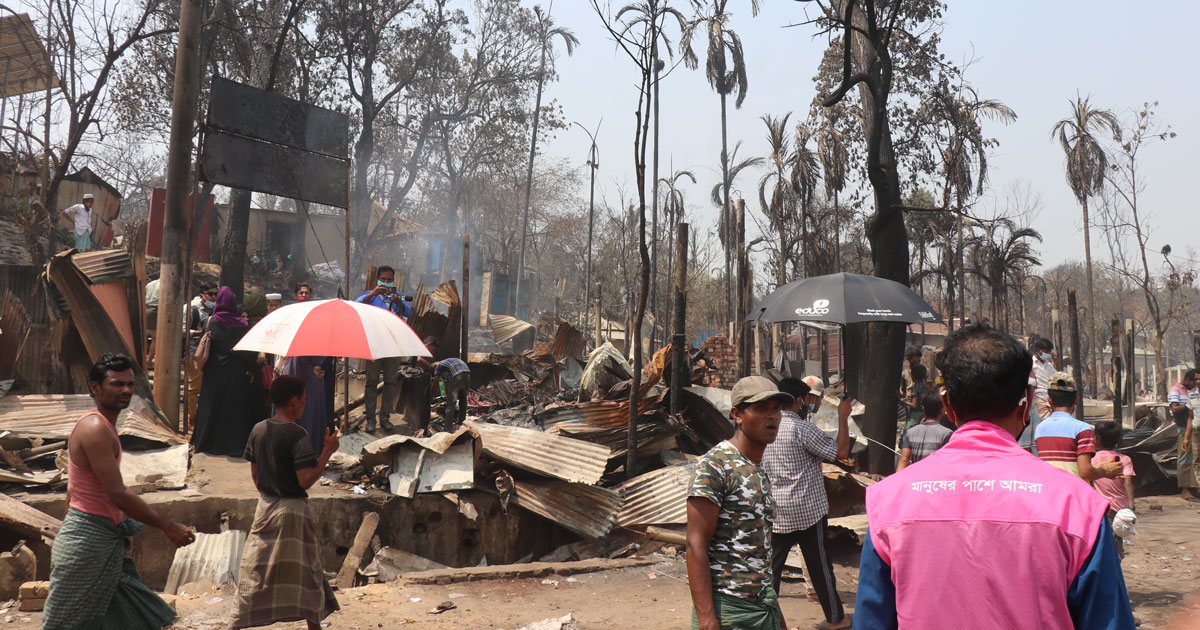
BRAC has mobilised its team on the ground to support families affected by a devastating fire in Rohingya camps in Ukhiya of Cox’s Bazar, Bangladesh.
The devastating fire that broke out in Rohingya camps of Kutulpalong Balukhali area on Monday afternoon displaced several thousand families who are squatting in the nearby open areas. Government response services, including fire services, rescue and response teams, and volunteers rushed to the spot immediately. Aid and development agencies joined the response efforts by the Refugee Relief and Repatriation Commissioner (RRRC) office and the work is still ongoing.
According to United Nations High Commissioner for Refugees (UNHCR), the incident site sheltered over 126,381 people before the fire incident and almost all of them are currently squatting in open areas.
The Deputy Commissioner of Cox’s Bazar and Upazila Nirbahi Officer of Ukhiya immediately visited the affected areas and requested BRAC to provide emergency basic support including to urgently ensure medical support with nurses, provide tarpaulin for temporary shelter and ensure female health and hygiene, and security services.
BRAC, in a prompt move, mobilised emergency medical team to provide basic first aid support to the affected people at the safe shelters.
BRAC Primary Healthcare Centres in camps 8E and 13 are fully operational and a medical team of 10-12 members are providing primary health support from the Balukhali Kashemia High School. A total of 233 injured people have already been provided with primary and emergency medical facilities.
BRAC has distributed 11,900 fortified biscuit packets (595 KG) and 8,000 liter of water bottles among the affected families taking shelter in the Balukhali Kashemia High School field. A total of 819 packets of cooked food were supplied to 556 people as lunch and dinners. BRAC provided 5500 jerry cans to OXFAM to ensure immediate water supply among the affected people and another 800 cans have been stockpiled for distribution.
So far, 977 pieces of tarpaulin have been distributed as emergency shelter support and another 1000 pieces have been kept aside.
Sajedul Hasan, Director of Humanitarian Programme at BRAC said, “It is a terrible disaster. We expect that coordinated interventions by the government, BRAC and other non-government organisations will bring normalcy into the lives of affected Rohingya families in the earliest possible time. BRAC already distributed food and drinkable water to the affected families. Healthcare facilities for the injured people are ongoing. Several initiatives have also been taken to ensure protection of women and children.”
The Gender Based Violence (GBV) team opened four SSWGs (Sub Sector Working Group) as an emergency shelter for women and girls in camps 8E, 8W, 5, and 6. Some families have already taken shelter there. There is a stockpile of 1,000 emergency dignity kits as emergency support for women and girls.
The Child Protection team has mobilised volunteers in the field to identify and support separated children and adolescents. By now identified missing children have already been fed with energy biscuits and taken them to safe shelters. Some centre managers are still near Balukhali to provide support to missing children and adolescents. High energy biscuits are being distributed to these missing children.
BRAC thanks local government authorities, partners and frontline responders who are working together to respond to the crisis and ensure safety for all.
Unity of NGOs must for effective collaboration with govt to sustain development
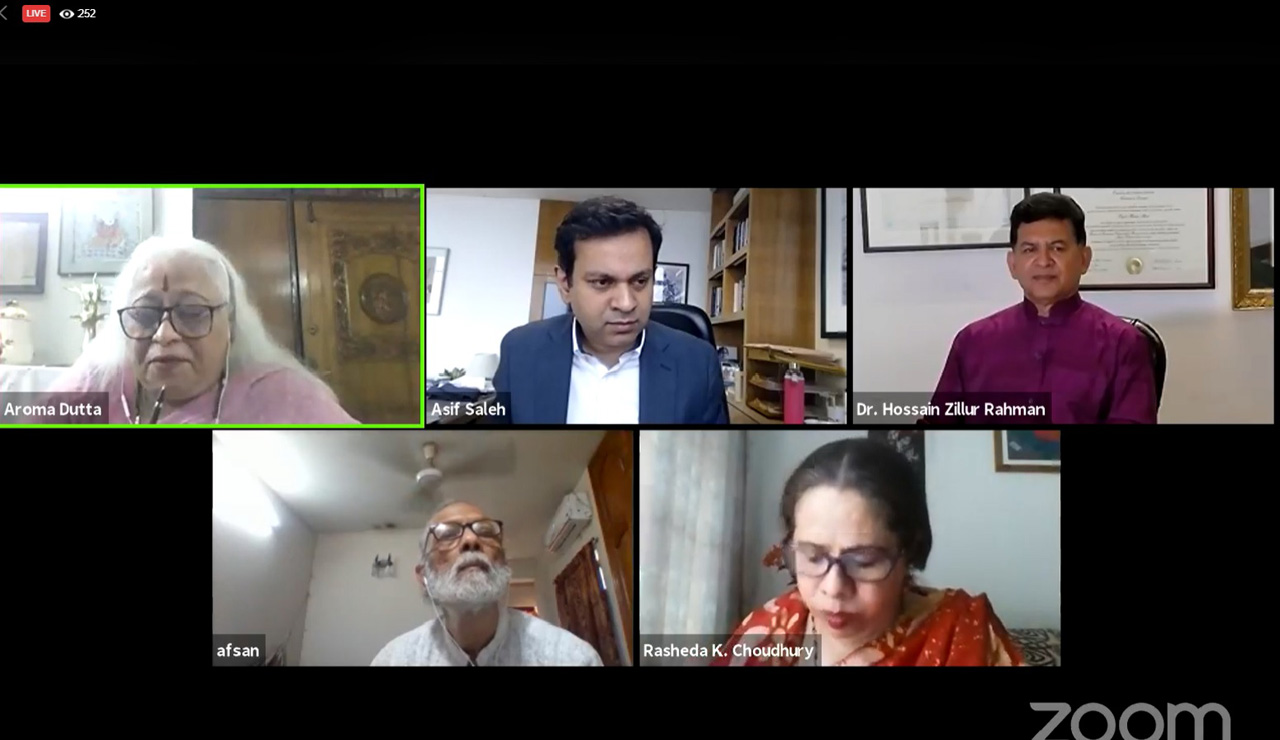
Non-governmental organisations must be united to continue sustainable development of future Bangladesh and ensure timely and quality services for the grassroots. Effective collaboration between the government and NGOs is also a prerequisite to sustain the fruits of development. These observations came from the speakers at an online discussion, marking 49th anniversary of BRAC.
As the nation counts down to celebrate the 50th anniversary of the great independence of Bangladesh, BRAC, one of its largest development partners, is also completing the 49th year of its establishment. To mark the occasion, BRAC organised an online discussion session titled “Bangladesh and BRAC: Collaboration for development” today on Sunday (21 March).
Moderated by executive director Asif Saleh, discussants at the event were Dr Hossain Zillur Rahman, chairperson of BRAC and former adviser to the Caretaker Government, Aroma Dutta, member of parliament and executive director at Prip Trust, Rasheda K Choudhury, executive director at Campaign for Popular Education (CAMPE) and former adviser to the Caretaker Government, and Afsan Chowdhury, eminent researcher and senior journalist.
Founded in 1972, BRAC innovated frugal and effective solutions in socio-economic sectors, including education, health and nutrition, microfinance and social enterprises, women development, human rights and legal aid, agriculture and food security, urban development, road safety, climate change impacts, skills development, migration and extreme poverty.
Its graduation model to tackle extreme poverty through combined services of handing over assets for income generation, livelihood and life skills training, health and education is now implemented by many agencies and governments across the globe in 46 countries. In the last nearly five decades, BRAC maintained the journey of liaison with the government of Bangladesh and other partners to bring essential services and opportunities for self-development at the door of the marginalised and poorest people.
Having praised BRAC for its role in empowerment of women reducing gender discrimination, lawmaker Aroma Dutta said in her discussion, “Bangladesh today is the best example of women empowerment in the world. Certainly, there were government initiatives, but it is BRAC that has brought the most remarkable changes at the field level. The government also expects BRAC’s cooperation in these initiatives.”
Speaking on BRAC’s role in achieving universal education in Bangladesh and its future strategy, CAMPE executive director Rasheda K Choudhury said, “It’s as though BRAC, Bangladesh and Abed Bhai have become synonymous. BRAC was at the heart of non-formal education. Yet why did Abed Bhai (Sir Fazle Hasan Abed) create a separate platform of CAMPE? He actually came up with the idea of forming this new coalition in the 1990s with the objective to put pressure on the government to focus on the development of the education sector. And it was a success. With the CAMPE’s initiative, students going to NGO-run schools began to get government textbooks for free from 2009.”
Eminent researcher and senior journalist Afsan Chowdhury commended BRAC for its collaboration with the government in implementing the national social development policies. “BRAC is formulating its action strategies keeping in view the demands of the people of this country and not giving priority to the western ideas of development. On the programme BRAC initiated for the ultra poor communities, Abed Bhai used to say that the programme would benefit the extreme poor to become self-dependent instead of becoming burdened with loans. He took initiatives to develop market for the poor.”
BRAC chairperson Dr Hossain Zillur Rahman focused on the organisation’s strategy for poverty alleviation and better living standard. “The greatest achievement of BRAC and Abed Bhai is that they have consolidated the role and work of NGOs in Bangladesh and by doing that they inspired the grassroots people to become self-confident.”
“Focusing on the opinions of the marginalised people in formulating their action strategies and taking up own income generation initiatives instead of depending on donor assistance are the two other major achievements,” he further observed, saying that the latter idea is the genesis of social enterprises in the development sector.
Please find the video: https://www.facebook.com/BRACWorld/videos/789330828350895
BRAC wins ICMAB Best Corporate Award

The Institute of Cost & Management Accountants of Bangladesh (ICMAB) has awarded BRAC the first position in the ICMAB Best Corporate Award-2019.
BRAC, the number one NGO in the world, has secured Gold Award under NGO Category in the competition.
Tipu Munshi MP, Hon’ble Minister, Ministry of Commerce, Government of People’s Republic of Bangladesh handed over the award to Ashit Baran Das, Associate Director (Finance & Accounts) of BRAC at a ceremony organized at Radisson Blu Dhaka Water Garden in Dhaka today evening (Thursday, February 25, 2021).
Professor Shibli Rubayat-Ul-Islam, Chairman, Bangladesh Securities and Exchange Commission (BSEC), Dr. Md Jafar Uddin, Secretary, Ministry of Commerce, Government of People’s Republic of Bangladesh, Sheikh Fazle Fahim, President, The Federation of Bangladesh Chambers of Commerce and Industry (FBCCI), A.K.M. Delwar Hussain FCMA, President, South Asian Federation of Accountants (SAFA) were also present as the special guests in the event.
BRAC received many awards in the field of financial transparency in different times including Institute of Chartered Accountants of Bangladesh (ICAB) National Award under the category of NGOs, Institute of Cost and Management Accountants of Bangladesh (ICMAB) Best Corporate Award in the NGO category, and prestigious South Asian Federation of Accountants (SAFA) award for best presented annual report in the non-governmental organisation category.
New platform of NGOs and citizen organisations launched in Bangladesh
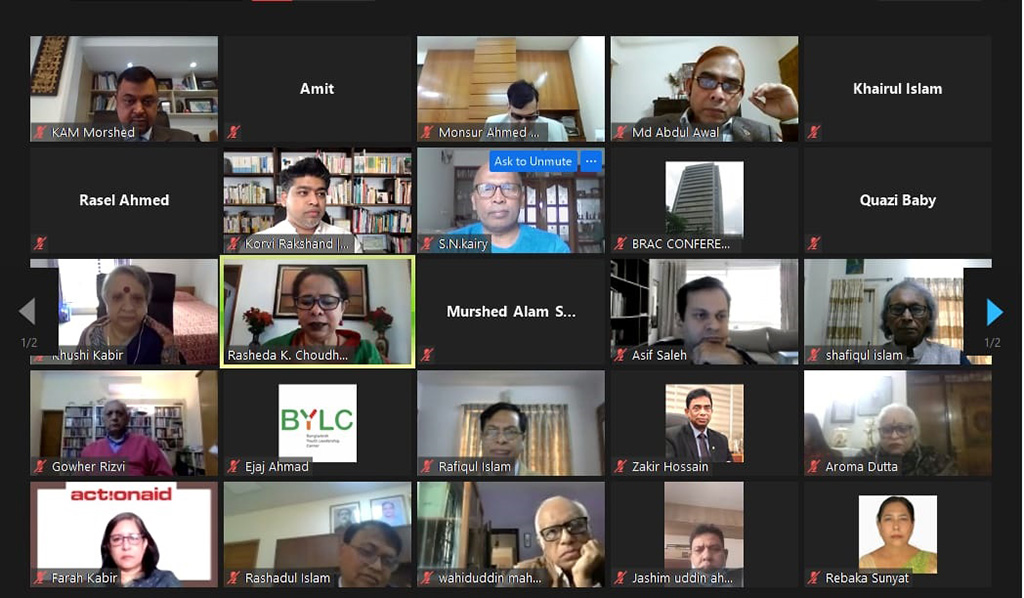
Dr Gowher Rizvi, international affairs adviser to the prime minister, said, “NGOs have immense contribution in the development of Bangladesh. The citizen groups have been actively engaged in their role since the birth of Bangladesh. Formation of a greater platform bringing the development organisations and civil society groups together is a positive initiative indeed. An important task of this platform will be to have in-depth research to find solutions for hunger, poverty and lack of education. It will then help build successful advocacy.” He made these remarks while speaking as the chief guest at a virtual event organised to announce the formation of a greater platform of civil society organisations of Bangladesh.
He further viewed that the newly founded platform can play a very important role for Bangladesh to achieve its SDG 2030 targets. Bangladesh must be able to deal with these challenges more efficiently, while it advances towards graduating to a middle income country. We should now reach the disadvantaged and deprived communities with services on priority basis, Dr Rizvi said.
The event was organised on the morning today on Tuesday (22 December) with NGO Affairs Bureau director-general Md Rashadul Islam and eminent economist Professor Wahid Uddin Mahmud present as special guests.
At the virtual programme, the organisers focused on the mission, objectives and next steps of the newly founded platform. They also announced that BRAC will be its secretariat for first two years.
Having called for everyone to engage in a concerted manner in tackling COVID-19 pandemic, NGO Affairs Bureau director-general Md Rashadul Islam said collaborative efforts will take our country to the targeted position of development. The NGO Affairs Bureau will give all possible assistance in this regard, he also pledged.
“Creating a collaborative relation with the government as well as forming common platform for all the non-governmental organisations are exceedingly important tasks for ensuring inclusive development and establishing a progressive society. The service giving development organisations are a big strength for Bangladesh,” said eminent economist Professor Wahid Uddin Mahmud, who further stressed that the government has to act pro-actively for enabling the development organisations to operate with freedom while maintaining accountability and commitment.
Leaders of over 500 NGOs and civil society organisations were present at the virtual event chaired by Rasheda K Chowdhury, chairperson, Campaign for Popular Education (CAMPE), and former adviser to the Caretaker Government, and moderated by BRAC’s senior director KAM Morshed.
The organisers at the event said that the NGOs have become a centre of learning for the development practitioners across the world for their important role in the development of the socio-economic sectors of Bangladesh. However, despite the impressive achievements of the sector particularly in the health, education and women empowerment, effective coordination and representation remained a big challenge for the NGO sector especially in the last two decades. This problem was most seriously felt when the government, having formulated the ‘Foreign Donations (Voluntary Activities) Regulation Law’ published it on the website of the NGO Affairs Bureau in January of 2012, and called for opinions.
In the absence of a national platform the development and civil society organisations found it difficult to discuss on the draft law and come out with concrete suggestions. This context as well as to enable the NGOs play their role more effectively in tackling the COVID situation, such a platform has become more necessary than ever.
Former BRAC chairperson late Sir Fazle Hasan Abed took special initiative in this regard and during his final days he started consultations with many NGO leaders. Inspired by his wish and effort, BRAC began the discussion anew in February of the current year (2020) and organised a series of meetings also.
The objectives of the proposed CSO platform are – Acting in collaboration with the government in finding effective solutions for the issues such as graduating to middle income country, fourth industrial revolution, climate change impact, COVID-induced challenges facing the health sector. Creating opportunity for CSOs to exchange their acquired knowledge and experience is also an objective. Celebrating together 50 years of independence of Bangladesh is also part of the objective of the new platform.
Aroma Dutta, member of parliament, Dr Fahmida Khatun, executive director, CPD, Asif Saleh, executive director, BRAC, Khusi Kabir, coordinator, Nijera Kori, Dr Maleka Banu, general secretary, Bangladesh Mohila Parishad, Shahin Anam, executive director, Manusher Jonno Foundation, Sharif Jamil, general secretary, Bangladesh Poribesh Andolon, Karavi Rakhsan, founder, Jago Foundation, Farah Kabir, Bangladesh country director, Action Aid, Sanjib Drong, general secretary, Bangladesh Adivasi Forum, Shafiqul Islam, representative, INGO Forum, and Mansur Ahmed Chowdhury, managing director, Bangladesh Jatiya Protibondhi Kalyan Foundation, spoke at the event, among others.
1st death anniversary of Sir Fazle Hasan Abed on 20 december
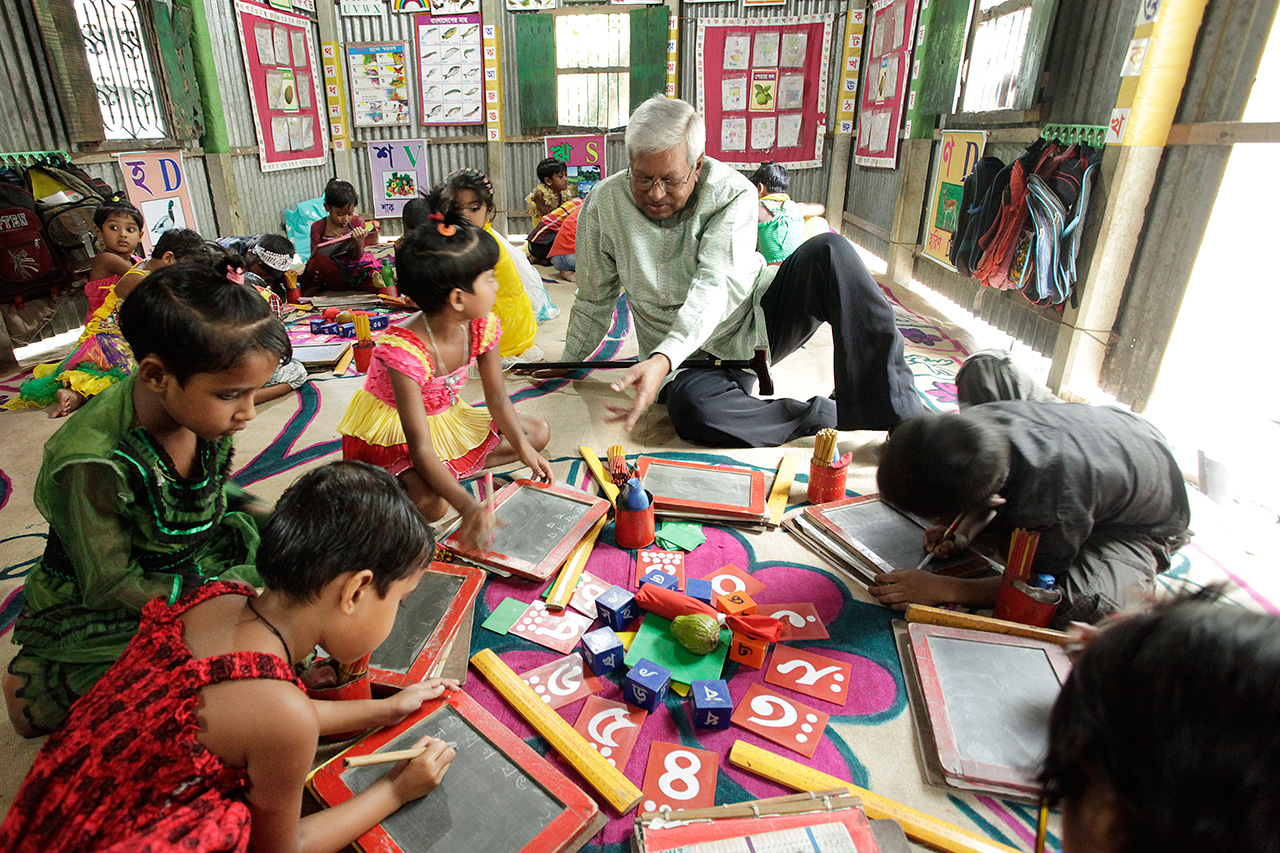
BRAC commemorates its founder Sir Fazle Hasan Abed on his first anniversary of death tomorrow on Sunday (20 December). Last year (2019) he died on this day at a hospital in Dhaka.
No elaborate events, however, will be organised to commemorate the day due to the ongoing Covid situation.
BRAC and BRAC University have organised online discussion sessions, paying respect to the vision of life and values that Sir Fazle cherished in his life. All the members of BRAC staff in their commemoration remember the eternal source of inspiration that the founder will continue to be in their life. They have pledged to stand beside the poor and marginalised communities and work hand in hand to build an equal for all.
Sir Fazle established BRAC in 1972 as a small relief and rehabilitation effort carried out in a remote area of Sylhet division. That organisation transformed itself to one of the largest and effective NGOs of the world through successful socio-economic programmes in many sectors carried out in last 47 years. BRAC now stands as a unique ecosystem interweaving microfinance, social enterprises, university, bank and multidimensional investments targeting the development of the poor and marginalised people. It now provides multifaceted services to over 100 million people in 12 countries of Asia and Africa, assisting them in bringing lasting changes in their lives.
About Sir Fazle Hasan Abed
Sir Fazle was born in 1936 in Bangladesh. He studied accountancy in London, qualifying as a cost management accountant in 1962. While he was working as a senior corporate executive at Pakistan Shell Oil, the 1970 cyclone and 1971 Liberation War in Bangladesh dramatically changed the direction of his life. He left his job and moved to London, where he helped initiate Action Bangladesh and HELP Bangladesh in support of the Liberation War.
Early in 1972, after the war was over, he returned to the newly-independent Bangladesh, finding the economy in ruins. The return of 10 million refugees who had sought shelter in India during the war called for urgent relief and rehabilitation efforts. Sir Fazle established BRAC to address the needs of refugees in a remote area of north-eastern Bangladesh, guided by a desire to help people living in poverty develop their own capacity to better manage their lives.
Today BRAC is one of the largest NGOs in the world, operating across 11 countries in Africa and Asia. Its primary objective is to empower people living in poverty and inequality. In 2020, for the fifth year in a row, BRAC was ranked first among the world’s top 500 NGOs by Geneva-based NGO Advisor; based on its impact, innovation and sustainability.
Awards and Recognition
Sir Fazle was honoured with numerous national and international awards for his achievements in leading BRAC, including the Yidan Prize for Education Development (2019), LEGO Prize (2018), World Food Prize (2015), Spanish Order of Civil Merit (2014), Inaugural WISE Prize for Education (2011), David Rockefeller Bridging Leadership Award (2008), Inaugural Clinton Global Citizen Award (2007), UNDP Mahbubul Haq Award for Outstanding Contribution to Human Development (2004), Olof Palme Prize (2001) and Ramon Magsaysay Award for Community Leadership (1980).
He has also been recognised by Ashoka as one of the ‘global greats’; and is a founding member of its prestigious Global Academy for Social Entrepreneurship. He was a member of the Commission on Health Research for Development (1987-90), the Independent South Asian Commission on Poverty Alleviation (1991-92), and the High-level Commission on Legal Empowerment of the Poor (2005-2008). In 2010, he was appointed Knight Commander of the Most Distinguished Order of St. Michael and St. George by the British Crown in recognition of his services to reducing poverty in Bangladesh and internationally. Sir Fazle was a member of the Group of Eminent Persons appointed by the UN Secretary-General in 2010 to advise on support for the Least Developed Countries. In 2014 and 2017, he was named in Fortune Magazine’s List of the World’s 50 Greatest Leaders. Sir Fazle was honoured with a Dutch Knighthood in 2019.
Bangladesh has been a distinguish exemplar on how to adapt to climate change impact
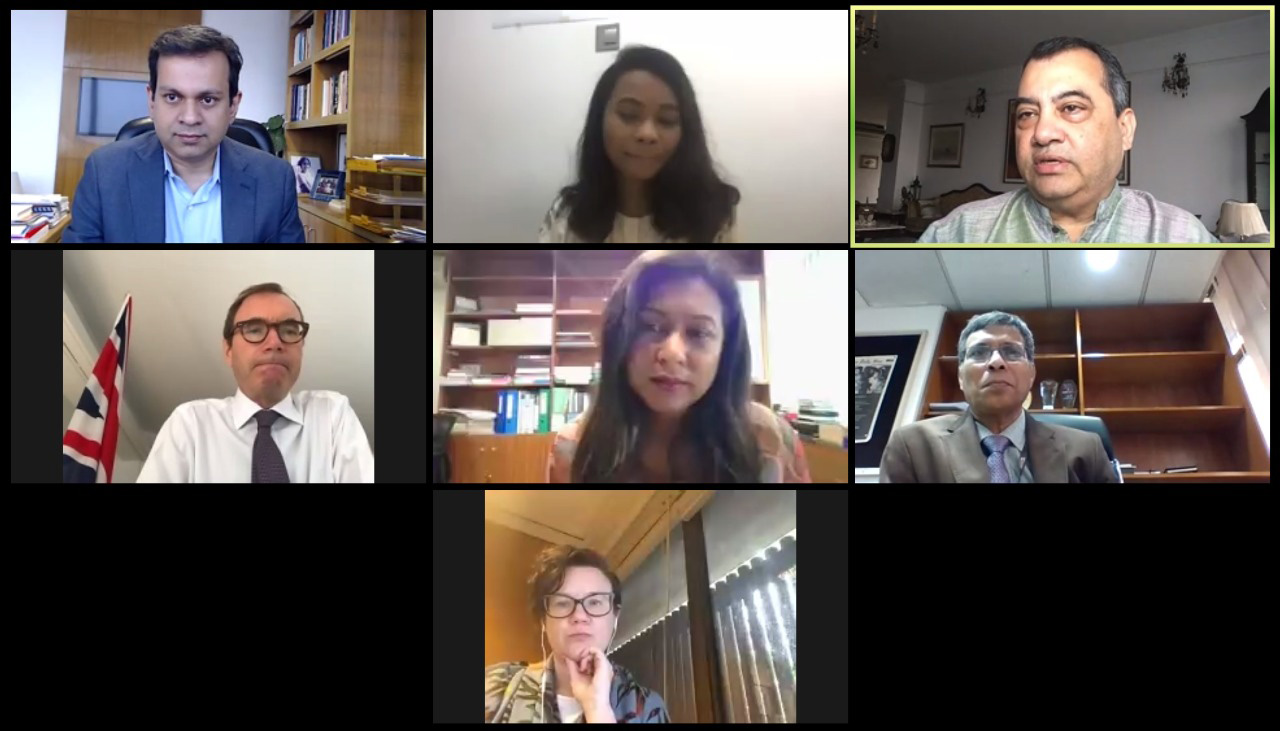
“Bangladesh has been a distinguish exemplar on how to adapt to climate change impact and the effectiveness of responding to extreme weather events and extra ordinary achievement in reducing climate change vulnerability through adaptation”This afternoon, Thursday (10 December), the British High Commissioner Robert Chatterton Dickson made the following remarks as Special Guest of the virtual launch of the book titled ‘Building Resilience to Climate Change through Craftsmanship’, organised by BRAC Climate Change Programme. He also added, “People who are most vulnerable to climate change will be made worse off in future to due to increasing climate change impact and we have been working in Bangladesh in reducing the impact through our support in various sectors access to food, Water ,sanitation, education, health.
“BRAC with Aarong is building resilience of individual by supporting artisans in order to support their families and link the village people with commercial market making it more sustainable.”
The book illustrates the ways BRAC’s sister concern, the Ayesha Abed Foundation, works to transform communities from areas at risk from climate change into ones that are resilient. The book features stories from the lives of 14 artisans, offering an insight into their sufferings due to climate change. In addition, it also goes on to portray their lives’ struggles, and how through employment at the Ayesha Abed Foundation the artisans took opportunities to utilise and maximise on their potentials and skills.
Chairman of the Standing Committee on Ministry of Environment, Forest and Climate Change, Saber Hossain Chowdhury, MP graced the webinar as Chief Guest. Chaired by Asif Saleh, Executive Director of BRAC Bangladesh, the webinar was also graced by the presence of Dr Ainun Nishat, Adviser to the Center for Climate Change and Environmental Research and Ex-Vice Chancellor of BRAC University, Tamara Hasan Abed, Managing Director of BRAC Enterprises, Kate Sangster, First Secretary of the Australian High Commission and Head of DFAT, and others.
Chief Guest Saber Hossain Chowdhury remarked “This book is not just a publication. It’s a story of Bangladesh. Bangladeshis has the natural ability to confront adversity and smile”
“Climate change impact will intensify and the recurrence of the climate hazards will increase in future. It is not practically possible to completely mitigate the impact of climate change. But we can fight through it by building our resilience and that’s exactly what BRAC has been doing.”
“Aarong is helping people to help themselves in building their resilience. Occurrence of multiple hazards at the same time is always going to test our ability to adapt to the adversity imposed by climate change. Initiative like this is what sustains Bangladesh by building the resilience of its most vulnerable people”
Partaking in the discussion on the published book, Tamara Hasan Abed, Managing Director of BRAC Enterprises, said, “The book portrays the stories of Aarong’s artisan living in climate change hotspots and greatly impacted by climate change. The stories in this book resonate the deep connection Bangladesh has both with its heritage crafts and rivers that fed this land. Climate change impact is felt by us all. These are the stories of people who are worse affected by the impact of climate change and now they have learnt to adapt and live. These are stories behind the labels that many of us have hanging in our closet”.
Kate Sangster, First Secretary of the Australian High Commission and Head of DFAT, noted “Climate change affects the poorest particularly the women and girls. What’s beautiful about this book is that it shows how decent and dignified work can help vulnerable people give back the autonomy that will help them to absorb and cushion the shocks of climate change and thus build their resilience in the process.”
Asif Saleh, Executive Director of BRAC Bangladesh and Chairperson of the webinar, reflected Bangladesh is one of the countries most vulnerable to the impacts of climate change, and the people who live in the districts showcased in this book are being hit the hardest. The stories of these artisans are testament to that, illustrating the impact that sustainable livelihoods.
Notably, the Ayesha Abed Foundation currently has 15 production centers and 696 sub-centers spread across the country where products for Aarong are manufactured. Most of these production centres are situated in areas under risk from climate change.
Book link : https://brac.net/downloads/resilience.pdf
LGRD minister at seminar on urban development: Rural areas to be transformed into planned urban spaces to house rising urban population
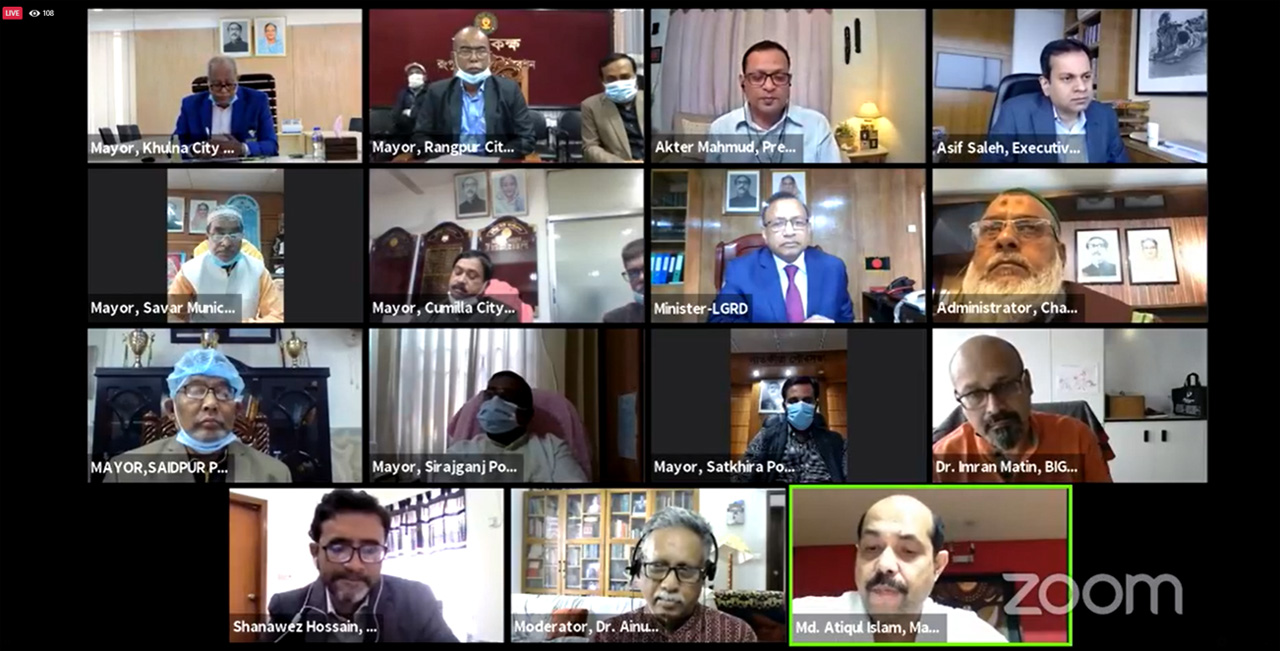
The minister for local government, rural development and cooperatives, Md Tajul Islam, stressed that the urbanisation in Bangladesh should essentially follow the direction our prime minister has given to transform the rural areas into urban spaces. “If we cannot accommodate people migrating into the urban areas we must transform the rural areas into pre-planned urban ones,” he said.
The LGRD minister made these observations in his chief guest’s speech today on Thursday (3 December) at an online seminar on housing and livelihood development of the urban poor communities.
The minister further emphasised that only putting the rising urban population into high-rises will not provide sustainable solutions until the communication is eased, and other problems related to logistics and utilities are taken care of. Therefore, urban resilience is an absolute necessity.
The seminar titled “Pro-poor, climate and disaster resilient urban development: Challenges and opportunities” was organised by BRAC Urban Development Programme (UDP) and attended by 20 city and municipality mayors from around the country.
Asif Saleh, executive director, BRAC, Professor Dr Akhter Mahmud, president, Bangladesh Institute of Planners (BIP), and Dr Imran Matin, executive director, BRAC Institute of Governance and Development (BIGD), BRAC University, also addressed the seminar, among others. Dr Ainun Nishat, Professor Emeritus, Centre for Climate Change and Environmental Research (C3ER), BRAC University, moderated the event. BIP, C3ER and BIGD also assisted in organising the seminar.
Professor Ainun Nishat appreciated the municipalities and city corporations of the country for their intent work on their development plans while drawing on own resources to address the growing challenges. He further said, “Empowerment of local government institutions, deliverable activities and social accountability are imperative for pro-poor, climate-resilient and sustainable urban development.”
DNCC mayor Atiqul Islam observed that many problems of the urban poor can be addressed through sustainable slum management in Dhaka city. While he asked for BRAC’s assistance in proper slum management in his jurisdiction, they mayor also stressed the importance of community members’ active involvement in monitoring the quality of service delivery of the city corporation staff.
Satkhira municipality mayor Md Tazkin Ahmed said trained and skilled manpower is essential for a municipality to do quality service delivery to its residents.
BRAC executive director Asif Saleh observed that for creating a robust and sustainable urban area empowerment and resource planning capacities of the local government bodies are two vital issues. “It’s important that the local authorities have been given the power to take actions in solving the local issues. Still there are issues of providing the mayors with planned budgets and required authority to approve action plans that need to be addressed. Though the condition of the capital city has improved from before as its mayors have more authorities now, it must also take place in all the other cities,” he further said.
More...
Join the world’s biggest family

